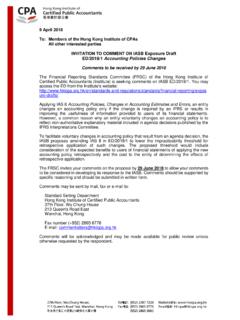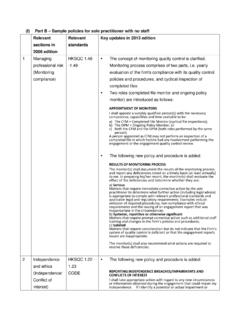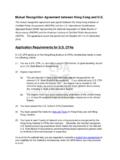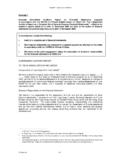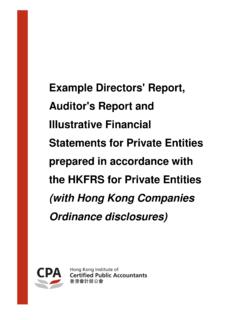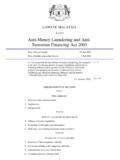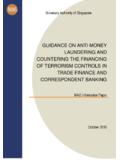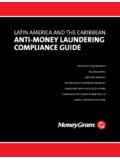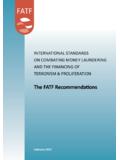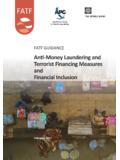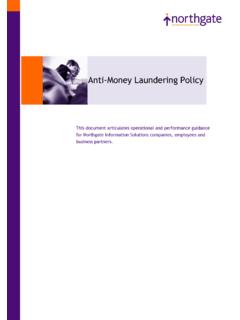Transcription of Guidelines on Anti-Money Laundering and Counter-Terrorist ...
1 Effective on 1 March 2018. Guidelines on Anti-Money Laundering and Counter-Terrorist financing for Professional Accountants (These Guidelines form part of the code of ethics). February 2018. CODE OF ETHICS FOR PROFESSIONAL ACCOUNTANTS. PART F Guidelines ON Anti-Money Laundering AND COUNTER- TERRORIST financing FOR PROFESSIONAL ACCOUNTANTS.. Pages Section 600 Overview and Application ..206 - 210. Section 610 AML/CFT Policies, Procedures and Controls ..211 - 214. Section 620 Customer Due Diligence ..215 - 228. Section 630 Ongoing Monitoring ..229 - 230. Section 640 Making Suspicious Transaction Reports ..231 - 238. Section 650 Financial Sanctions and Terrorist financing ..239 - 241. Section 660 Record Keeping.
2 242 - 243. Section 670 Staff Hiring and Training ..244 - 245. Appendix A E ..246 - 268. 205 COE (Revised February 2018). CODE OF ETHICS FOR PROFESSIONAL ACCOUNTANTS. Preamble The Anti-Money Laundering and Counter-Terrorist financing (Financial Institutions) (Amendment). Ordinance 2018, effective on 1 March 2018, extends the scope of the Anti-Money Laundering and Counter-Terrorist financing (Financial Institutions) Ordinance (Cap. 615)("AMLO") to cover "designated non-financial businesses and professions" ("DNFBPs"), including accountants. It implements the FATFRs as these relate to customer due diligence ("CDD") and record keeping ("RK"). for DNFBPs. These Guidelines are based on AMLO as amended, now entitled the Anti-Money Laundering and Counter-Terrorist financing Ordinance, and subsequent references to "AMLO" relate to the amended ordinance.
3 These Guidelines are effective as from 1 March 2018. SECTION 600. Overview and Application Introduction and purpose of Guidelines These Guidelines are published under section 7 of AMLO. They apply primarily to practices and members working in practices. Reference to "practices" in the Guidelines includes practice units under the Professional Accountants Ordinance (Cap. 50) and also trust or company service providers, where the proprietors, partners or directors are all members. Reference to "practices" should also be taken to include references to members working in practices, where the context may be so construed. The Guidelines should also provide useful information for members generally1.
4 In addition to AMLO, and in particular Schedule 2 of AMLO, these Guidelines also make reference to other existing legislation containing requirements relating to AML/ CFT, principally, the Drug Trafficking (Recovery of Proceeds) Ordinance (Cap. 405). ("DTROP"), the Organised and Serious Crimes Ordinance (Cap. 455) ("OSCO") and the United Nations ( anti -Terrorism Measures) Ordinance (Cap. 575) ("UNATMO"). AMLO. and relevant sections of the other ordinances together seek to give effect to the FATFRs. As a member of FATF, Hong Kong is required to implement a credible AML/CFT regime having regard to the FATFRs, substantial parts of which apply to DNFBPs as well as to financial institutions ("FIs").
5 It is recognised that, in contrast to certain FIs, practices are not licensed to hold client monies or process cash transactions, so generally money Laundering / terrorist financing ("ML/TF") risks may be lower for practices than for FIs. At the same time, members are bound by the Code of Ethics for Professional Accountants to conduct themselves with integrity and professionalism and to act in the public interest, not only the interests of their clients. Practices will therefore be expected by the community to have in place adequate CDD or "know your client" procedures and arrangements for maintaining documentation, to minimise any risk of involvement in ML/TF. 1 Members working in the financial services or other sectors specified in AMLO are advised to familiarise themselves with any Guidelines issued by the appropriate relevant authority or regulatory body under AMLO to facilitate compliance with the requirements of the ordinance.
6 206 COE (Revised February 2018). CODE OF ETHICS FOR PROFESSIONAL ACCOUNTANTS. Against the above background, these Guidelines are intended to: Provide general guidance on AML/CFT requirements under AMLO and other relevant legislation. Indicate good practice on applying other relevant FATFRs. Summarise relevant legislative provisions on AML/CFT. Ensure compliance by members with prescribed requirements to prevent ML/TF. activities. It should be noted that, while these Guidelines require compliance by practices with certain provisions, they do not constitute legal advice and, in case of doubt, members should consider seeking their own legal advice. A failure by a practice to comply with a provision in these Guidelines does not by itself render the practice liable to any judicial or other proceedings but, in any court proceedings under AMLO, the Guidelines are admissible in evidence; and if any provision set out in the Guidelines appears to the court to be relevant to any question arising in the proceedings, AMLO states that the provision will be taken into account in determining that question.
7 In considering whether a practice has contravened an applicable requirement under AMLO, or other AML/CFT-related legislation, the Institute will have regard to any provision in the Guidelines that is relevant to the requirement. More generally, practices that pay insufficient attention to the AML/ CFT issues covered in these Guidelines could be at greater risk of becoming unwittingly associated with ML/. TF activities, with potentially serious consequences, such as criminal prosecution and loss of reputation. In order to mitigate and address the risks, whether legal, regulatory and reputational, of being found to be involved in facilitating, or turning a blind eye to, ML/TF, it is in the interests of practices to familiarise themselves with these Guidelines and to take on board the relevant FATFRs within their risk management programmes, including those FATFRs already implemented in legislation other than AMLO, such as the requirement to report suspicious transactions under DTROP and OSCO.
8 Use of the word "must" in these Guidelines indicates a mandatory requirement, which may be a statutory obligation, or requirement that directly flows from this, or is seen by the Institute as being necessary to implement the statutory obligation effectively. In contrast, use of the words should , "would" and "may" in these Guidelines is not intended to indicate a mandatory requirement, but to provide guidance on possible means of compliance with statutory and regulatory requirements, and/or suggest good practice regarding compliance with the FAFTRs. Practices should consider their own particular circumstances when determining how to apply the detailed provisions of these Guidelines , and take into account the relevant legislation and mandatory requirements.
9 For terms, abbreviations and definitions used in these Guidelines members may also refer to Appendix E. 207 COE (Revised February 2018). CODE OF ETHICS FOR PROFESSIONAL ACCOUNTANTS. Application of the Guidelines The Guidelines AML/CTF CDD, RK and Suspicious Staff hiring and apply to practices policies, ongoing transaction training (see paragraph procedures monitoring reporting and (section 670). ) as follows: and controls (sections financial sanctions (section 610) 620,630,660) (sections 640,650). When providing any Mandatory Mandatory Mandatory Mandatory service specified in paragraphs or When providing Good practice Good practice Mandatory Good practice services other than those specified in paragraphs or When practices, by way of business, prepare for or carry out for a client a transaction concerning one or more of the following services, there are specific CDD, ongoing monitoring and RK measures that they must adopt, as set out in Sections 620, 630 and 660: (a) buying and selling of real estate.
10 (b) managing of client money , securities or other assets;. (c) management of bank, savings or securities accounts;. (d) organisation of contributions for the creation, operation or management of companies;. (e) creation, operation or management of legal persons or arrangements;. (f) buying and selling of business entities. In addition, practices that provide trust or company services must adopt CDD, ongoing monitoring and RK procedures, when, by way of business, they prepare for or carry out for a client a transaction concerning any of the following services: (a) forming corporations or other legal persons;. (b) acting as, or arranging for another person to act as, a director or secretary of a company, a partner of a partnership, or a similar position in relation to other legal persons.




